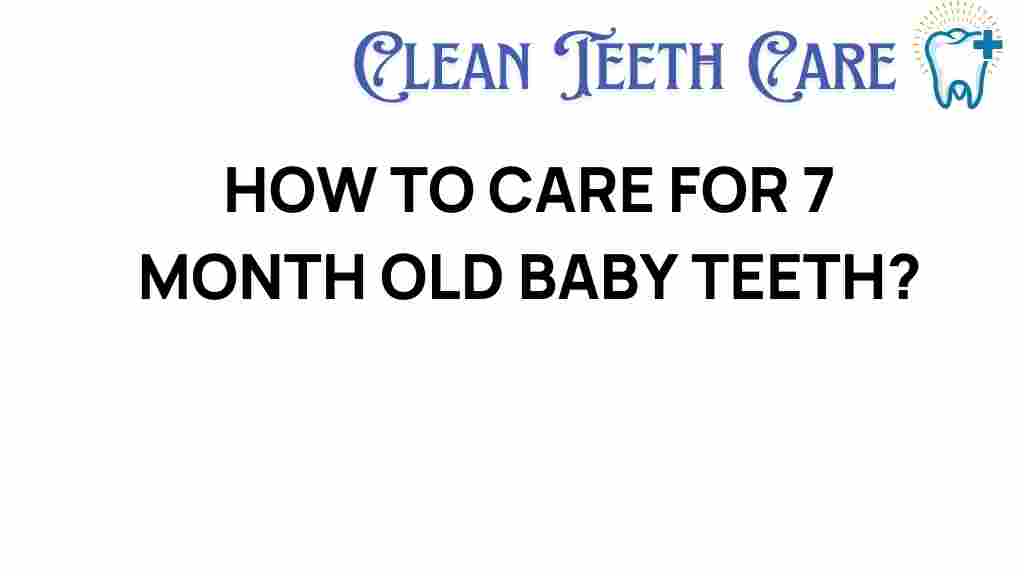Essential Tips for Caring for Your 7-Month-Old Baby’s Teeth: Baby Dental Care
As a parent, one of your primary concerns is ensuring the health and well-being of your child. This includes baby dental care, which is crucial even at the tender age of 7 months. At this stage, your baby’s first teeth are beginning to emerge, and proper oral hygiene is essential for establishing a foundation for a lifetime of good dental health. In this article, we will explore effective ways to care for your baby’s teeth, tips for managing teething, and overall children’s health regarding oral care.
Understanding Infant Teeth and Teething
Teething typically begins around 6 months of age, although some infants may start earlier or later. The first teeth to emerge are usually the two bottom front teeth, followed by the four upper front teeth. Understanding this process helps you prepare for your baby’s changing needs and provides you with strategies to support them during this time.
- Symptoms of Teething: Common signs include drooling, irritability, swollen gums, and a desire to chew on objects.
- Teething Timeline: Most babies will have their first tooth by their first birthday, but the timeline varies.
Step-by-Step Guide to Baby Dental Care
Here’s a practical step-by-step approach to ensure your 7-month-old’s oral hygiene is well taken care of:
1. Clean Your Baby’s Gums
Before teeth emerge, it’s essential to start cleaning your baby’s gums. Use a soft, damp washcloth or a finger brush to gently wipe the gums after feedings. This practice helps remove bacteria and establishes a routine.
2. Introduce a Toothbrush
Once your baby’s first tooth comes in, you can introduce a soft-bristled toothbrush designed for infants. Use water only, as fluoride toothpaste is not recommended until your child is around 2 years old. Here’s how to do it:
- Choose a toothbrush with a small head and soft bristles.
- Gently brush the tooth in circular motions.
- Make it a fun experience by singing a song or making silly faces.
3. Monitor Diet for Dental Health
Diet plays a crucial role in your baby’s dental health. Here are some tips:
- Avoid sugary drinks and snacks, which can lead to cavities.
- Encourage healthy foods like fruits and vegetables.
- Limit fruit juices; if you offer them, ensure they are diluted.
4. Establish a Routine
Create a daily routine for baby dental care. Consistency helps your baby understand that caring for their teeth is a regular part of life. Aim to clean your baby’s teeth twice a day—once in the morning and once before bed.
Managing Teething Discomfort
Teething can be uncomfortable for your baby, leading to fussiness and sleepless nights. Here are some tips to help soothe their discomfort:
- Offer teething toys that are safe and made of soft rubber or silicone.
- Chill a damp washcloth in the refrigerator for your baby to chew on.
- Massage your baby’s gums gently with a clean finger.
- If necessary, consult your pediatrician about teething gels or pain relievers.
Common Troubleshooting Tips
As you navigate baby dental care, you may encounter challenges. Here are some common issues and how to address them:
1. Sensitivity to Toothbrush
If your baby resists brushing, try these strategies:
- Let your baby hold the toothbrush while you brush their teeth.
- Use a toothbrush with a character or design they love to make it more appealing.
- Incorporate brushing into playtime to reduce anxiety.
2. Excessive Drooling
Drooling is common during teething. To manage it:
- Keep your baby’s chin dry to prevent rashes.
- Use bibs to soak up excess drool.
- Wipe their face regularly to keep it clean.
Importance of Early Dental Visits
It’s recommended to schedule your baby’s first dental visit by their first birthday or within six months of the first tooth emerging. This early care helps identify any potential issues and guides you on maintaining good oral hygiene.
During this visit, a pediatric dentist will:
- Check for any signs of decay or dental issues.
- Provide guidance on proper brushing techniques.
- Discuss your baby’s diet and how it impacts dental health.
Parenting Tips for Supporting Dental Health
As a parent, your role in supporting your baby’s oral hygiene goes beyond just brushing their teeth. Here are some effective parenting tips:
- Lead by example: Show your child how you care for your own teeth.
- Make dental care a family activity to foster a positive attitude towards oral hygiene.
- Educate yourself about infant teeth and teething so you can provide the best care.
Conclusion: The Foundation for a Lifetime of Healthy Teeth
Caring for your 7-month-old baby’s teeth is a vital aspect of early childhood parenting. By implementing these baby dental care tips, you are setting the stage for lifelong healthy habits. Remember, early care is key. Make dental visits a priority, maintain a consistent brushing routine, and manage teething discomfort effectively. For more information on children’s health, you can visit this resource.
By being proactive and engaged, you will contribute significantly to your child’s well-being and confidence in taking care of their teeth as they grow. Your efforts today will lead to a brighter, healthier future for your child’s smile!
This article is in the category Kids and created by CleanTeethCare Team
